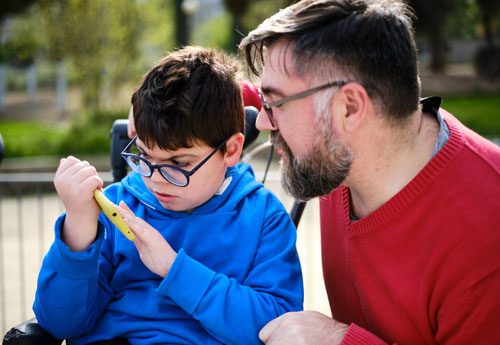There’s no way around it. Fathering is a tough job. Fathering a child with disabilities is even tougher. With so many additional challenges and concerns, there may be days when you wonder if you’re really cut out for the position.
This Father’s Day, consider what you can do to make your parenting journey less stressful and more joyful. With the right self-care and support, you’ll find that the reward of being a dad to a child with special needs is well worth the trials and tribulations.
1. Feel your feelings
Most likely, you didn’t go into fatherhood expecting to have a child with a disability. You may have lots of fantasies about what your child will be like, and all kinds of plans for what you will do together as he grows up. When you realize that some of your fantasies and plans may not materialize in the way you imagined, it’s only natural to experience grief. Unfortunately, some dads feel guilty about their grief and try to put on a brave front. They may repress their feelings at the expense of themselves and their child. Allow yourself to experience all the emotions that come with the birth of a disabled child or a child who is diagnosed with a disability or serious illness later in life. Only after grieving what might have been, will you be able to move on, come to grips with the new reality, and begin to find joy in the child that you have.
2. Get involved in childcare
Sometimes dads shy away from their child’s day-to-day care, letting moms or other caregivers take it on. Don’t sell yourself short. You can be successful at the nitty gritty of caring for your son or daughter. Feeding, dressing, diaper changing and giving your child a bath are wonderful ways to bond with her and can be wonderful experiences for both of you.
3. Set aside time for you and your partner
Raising children, especially children with special needs, can put a lot of stress on a relationship. Though it’s hard to trust others to care for a child who is ill or disabled, it’s essential to have quality time with your significant other. Don’t be afraid to ask family and friends to chip in to babysit or provide respite. The healthier your relationship, the better off your child will be.
4. Seek support
Caring for a child with disabilities can be stressful and emotionally draining, leading to mental and physical health challenges. Don’t be afraid to seek help from a professional counselor, therapist, or clergy. Staying mentally and physically strong will ensure that you have what it takes to be a good father.
5. Find community
Too frequently, parents of children with disabilities allow themselves to become isolated from their peers. Look for parent support groups, start friendships with other families with disabled children and join inclusive communities where you and your child can make friends and enjoy the company of others.
6. Take a break
Though it may feel counter intuitive when things are hectic at home, it’s vital to take time to recharge your battery. Whether it’s socializing with friends, doing yoga or meditation, playing basketball, getting a massage or reading a book at a bar or coffee shop, it’s important to give yourself regular opportunities to rejuvenate. It will help you be the best dad you can be.


